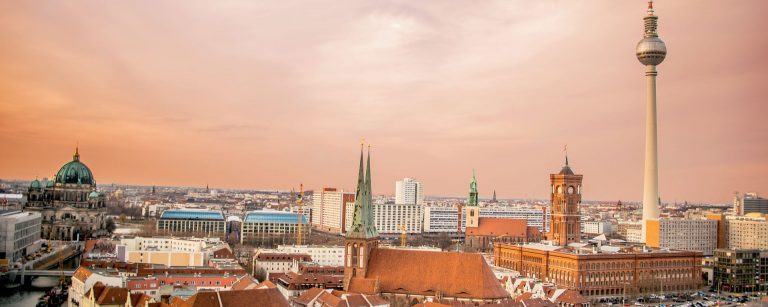In a study published recently, IKEM – Institute for Climate Protection, Energy and Mobility – proves that Berlin can be supplied to a large extent with renewable electricity from Brandenburg. To do this, the authors compared real-time generation and consumption loads of the two regions. The study was commissioned by the ‘Lokale Energie’ Platform and conducted under the auspices of the Berlin-Brandenburg regional association which is part of the German WindEnergy Association (BWE).
Most of Berlin’s electricity needs can be met with renewables.
The study pays special attention to the simultaneity of green generation and consumption. Especially when the supply is based on wind and photovoltaic systems, it is important that green electricity can actually be provided when it is needed. For verification, the authors used minute-by-minute generation data from renewable energy plants in both Brandenburg and Berlin. These data were also compared with precise consumption data for public properties in Berlin. These include, for instance, hospitals, schools and city halls.
The most important finding from a technical point of view is that electricity generation and demand largely overlap. Today, a large share of Berlin’s electricity needs can already be met with green energy.
“Berlin as an electricity consumer and Brandenburg as a green power producer complement each other perfectly. If the expansion of renewable energies continues, it will be possible to supply the capital with green electricity at the same time. The Berlin-Brandenburg metropolitan region is well on its way to becoming a beacon of the energy transition,” says IKEM Managing Director and Head of the Local Energy Platform Simon Schäfer-Stradowsky.
Green power supply: A challenge for the energy industry
Against the backdrop of Berlin’s ambitious 2030 energy and climate protection program, around 30 to 40 percent of the capital’s energy needs are to be met with electricity from Berlin-based photovoltaic systems. As has been shown, any remaining demand could be met with Brandenburg’s electricity from renewables.
Simply switching to so-called green electricity will not be enough to achieve these goals, explains Tom Lange, Berlin regional chairman of the German WindEnergy Association (BWE): “Regular green electricity products often lack an expansion effect, as only electricity from renewable energy plants that already exist is marketed. The shares of electricity from renewable energies in the electricity mix are allocated to a certain customer group in the balance sheet and replaced elsewhere by fossil generation.” However, he said, the supply of renewably generated electricity must be secured at the time of consumption, not only on a balance sheet. The resulting additional demand for genuinegreen electricity is expected to provide incentives for the expansion of renewables as well as a positive climate protection effect.
For this reason, the study also addresses the legal and economic feasibility of a green power product with a regional focus. Such a form of marketing could have a positive effects on renewable energy projects, prevent bottlenecks in the power grid and contribute to the decarbonization of other sectors. However, extensive challenges still need to be overcome: For example, the potential for regional marketing of green electricity is limited by the lack of room for maneuver in energy law. The authors therefore recommend adjustments to the legal framework.
Schäfer-Stradowsky: “In order to operate Berlin’s schools and hospitals in a climate-neutral manner, they need real green electricity, preferably from the region. Corresponding electricity products are not foreseeable in the current energy industry environment. This is where the legislator is called upon.”
Background
The study was funded by the ‘Lokale Energie’ Platform. Together with its partners, IKEM is working through the platform on numerous energy transition projects that bring together local green power producers, marketers and consumers. The aim is to establish the regional and direct marketing of renewable electricity as a building block of the energy transition and to enable local value creation.
The feasibility study was conducted by IKEM together with Kisters AG and the platform partners General Electric, Energiequelle, UKA Umweltgerechte Kraftanlagen GmbH, Berliner Stadtwerke, BLS Energieplan, and Regiogröön under the auspices of the BWE regional association Berlin-Brandenburg. The load and generation data were provided by davidberlin – for the Energy Management Office of the State of Berlin, Newmotion, Energiequelle, Teut Windprojekte and Kintlein & Ose. The Senate Department for Economics, Energy and Operations of the State of Berlin and the Ministry for Economics and Energy of the State of Brandenburg supported the preparation of the study.



